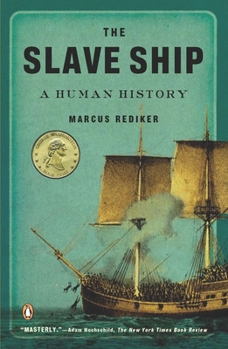The Slave Ship: A Human History
Select Format
Select Condition 
Book Overview
"Masterly."--Adam Hochschild, The New York Times Book Review In this widely praised history of an infamous institution, award-winning scholar Marcus Rediker shines a light into the darkest corners of the British and American slave ships of the eighteenth century. Drawing on thirty years of research in maritime archives, court records, diaries, and firsthand accounts, The Slave Ship is riveting and sobering in its...
Format:Paperback
Language:English
ISBN:0143114255
ISBN13:9780143114253
Release Date:September 2008
Publisher:Penguin Books
Length:448 Pages
Weight:0.95 lbs.
Dimensions:1.0" x 5.5" x 8.3"
Age Range:18 years and up
Grade Range:Postsecondary and higher
Customer Reviews
4 ratings
Moving account of a vile trade
Published by Thriftbooks.com User , 16 years ago
Marcus Rediker, of Pittsburgh University's History Department, has written a brilliant account of the machine that enabled history's largest forced migration. Exploration, settlement, production and trade all required massive fleets of ships. The slave ships, with names like Liberty, Free Love and Delight, transported both the expropriated labourers and the new commodities that they produced. The ships were weapons, factories and prisons too. These ships were the key to an entire phase of capitalist expansion. Between the late 15th century and the late 19th century, it is estimated that they transported 10.6 million people, of whom 1.5 million died in the first year of slavery. 1.8 million had died en route to Africa's coast, and 1.8 million died on the ships. So the trade killed more than five million people. The 18th century was the worst century, in which seven million people were transported, three million of them in British and US ships, from Liverpool, Bristol and London. Seven million slaves were bought in Britain's sugar islands, for toil in the plantations. For half the 18th century, Britain was at war with France or Spain, for markets and empire. The slaver merchant capitalists gained from it all. They hired the captains and the captains hired the sailors. The conflict between these two forces was the primary contradiction on board, until the ships reached the African coast, then all united against the slaves. The captains exercised the discipline of exemplary violence against slaves and sailors. Their cruelty and terror were not individual quirks but were built in to `the general cruelty of the system'. Rediker studies the conflicts, cooperation and culture of the enslaved. He shows how the enslaved Africans were the primary, and first, abolitionists, supported by dissident sailors and antislavery activists like Thomas Clarkson. The book renders the sheer horror of the experiences that this vile trade inflicted on people. Rediker concludes, "we must remember that such horrors have always been, and remain, central to the making of global capitalism." The British Empire, so romanticised by Brown, Blair and a horde of self-publicising sycophants, was built on this murderous trade.
Not just for the Americas
Published by Thriftbooks.com User , 16 years ago
I saw the review of this book in the WSJ and decided this was worth reading. As an African who comes from one of the major regions where slaves were taken, it was indeed a difficult read; I sometimes had to put it aside and reflect on what my people went through before, during, and after the passage. The material in this book does not just cover the history of the slaves taken to the Americas, but also the sailors and, especially, Africans themselves. I would implore my fellow Africans to read this book because it shows an essential part of our history that rarely gets the deserved attention. And it is only by knowing that history that we can move forward. Rediker does an impressive job showing why the stories of the slave ship should never be forgotten.
Eye Opening Account
Published by Thriftbooks.com User , 17 years ago
This is a very well documented accounting of a period of American History we would all want to forget. Each American, or would-be American will find this eye opening. There are many perspectives presented here, which, unfornately are not revealed in any other source that I've found. It puts a brand new view in front of the reader that allows a better understanding of what was considered a need for the economic development of a new world, that was conveniently found in the exportation of human labor. In the introduction, the author indicates the accounting was painful to write, and if he has done his job well, it will be painful to read. He did his job very well, as the book was spellbinding, loaded with data, and very painful to read. A lot is to be learned by reading this book. I'm left with the feeling that the use of human labor in such a fashion is still present in some parts of the world. The African-American community today, their strength and determination, is the result of their resilience, faith, hope and survival instincts brought on by the many years of struggle during this terrible period of our history. May it never be repeated.
Fasinating epic.........................
Published by Thriftbooks.com User , 17 years ago
The slave ship gives a fascinating forte in the archives of slavery and the making of modern history. It was a vehicle, transporting captives whose labor was necessary for America's economic survival; it was a factory, where African men, women, and children were transformed into "cargo"; and it was an instrument of war, complete with fearsome weapons with the capability to destroy any who might challenge its gruesome mission. In Marcus Rediker's book it explores these historical uses of the slave ship by drawing on an astonishing array of archival material, revealing the voices of slaves, common sailors, pirates, captains, and traders in all their complex humanity. Rediker's talent as a writer and a historian is to bring this kind of disparate information into one solid, available and enthralling narrative.






